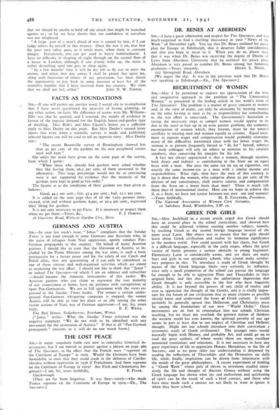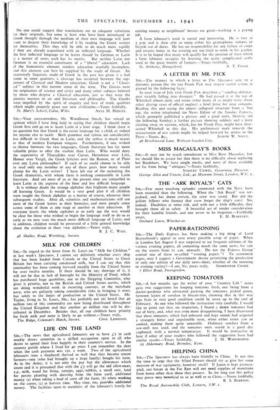GREEK FOR GIRLS SIR, —Miss Archibald in a recent article urged
that Greek should have an assured place in the school curriculum, and showed how this could be achieved without ousting another subject, namely, by teaching Greek as the second foreign language instead of the more usual Latin. Her object was to ensure that her girls should learn about Greek civilisation and realise its immense significance in the modern world. Few could quarrel with her thesis, but Greek is a difficult language, especially in the early stages, where the great variety of forms presents a serious obstacle to young beginners. Elementary Latin is considerably easier, and yet there are many boys and girls in our secondary schools who cannot make satisfac- tory progress in this. To introduce a study of Greek thought by means of the Greek language limits very seriously its influence, since only a small proportion of the school can pursue the language far enough to be able to appreciate Plato and Thucydides in their original form, and this also gives the unfortunate impression that Greek thought is only accessible to the few who have linguistic ability. It is not beyond the powers of any child of twelve and over to appreciate the thought of the Greeks, and it is vitally impor- tant for the future of our civilisation that as many citizens as possible should know and understand the bases of Greek culture. It would probably be generally agreed that Hellenism and Christianity must be among the foundations • of our new " World Order." Great movements are on foot to reintroduce into our schools Christian teaching, but we must not overlook the greatest nation of thinkers the western world has ever known; the spiritual poverty of our age seems in part at least due to our neglect of Christian and Hellenic thought. Might not our schools introduce into their curriculum a systematic study of Greek civilisation? The younger -ones would naturally begin with History, and probably Art, and could go on to read the great authors, of whose works there are many excellent annotated translations and selections. It is not necessary to have any great experience of life to appreciate Homer, Herodotus, or the life of Socrates; and as we grow older our understanding is deepened by reading the reflections of Thucydides and the Dramatists on daily life, while, finally, inspiration can be drawn from intercourse with the minds of the great philosophers. A recent experiment of holding a " Greek Week " where girls of eleven to seventeen studied inten- sively the life and thought of Ancient Greece without using the Greek language has shown what joy and enthusiasm and quickening of spirit can be the result of such a brief contact, and those who have once made such a contact are not likely to want to ignore it when they leave school.
No one could suggest that translations are an adequate substitute for their originals, but some at least who have been introduced to Greek thought through the medium of their own language will later want to deepen their knowledge of it by reading the Greek writers for themselves. This they will be able to do much more rapidly if they are already acquainted with an inflected language. Whether the first inflected language to be learnt should be German or Latin is a matter of taste; each has its merits. But neither Latin nor German is an essential constituent of a " liberal " education. Lack of the humanistic element renders education woefully incomplete, ind this element can best be supplied by the study of Greek. An excessively linguistic study of Greek in the past has given it a bad name in some. quarters; a cleavage has occurred between the sup- porters of Classical and Modern education; Greek is not a " Classi- cal " subject in this narrow sense of the term. The Greeks were the originators of science and civics and many other subjects beloved by those who despise a Classical education, just as they were the greatest masters in art and literature and philosophy. The Greeks were impelled by the spirit of enquiry and love of truth, qualities which might properly grace our new civilisation.—Yours fathfully,



























 Previous page
Previous page